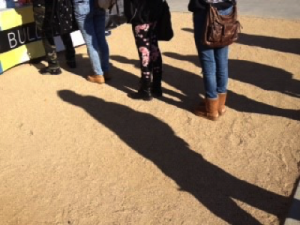The Heist and Cut
The Heist and Cut

Jessica Fields
The Beyond Bullying Project Team
The Beyond Bullying Project team

Jessica Fields
The Beyond Bullying Project Team
Three years ago,
after months of planning,
we launched
The Beyond Bullying Project
at West High School*
in San Francisco.

Jessica Fields
The Beyond Bullying
Project Team
On the second day, we showed up again: granola bars on the table, iPod to raffle off, and friendly grad student assistants engaging everyone who walked by. A resource staff member brought some of his students over. A member of his student club started decorating the booth with rainbows. By lunchtime, we had company. Over sandwiches and sodas, we heard stories about life at West High: the long commutes some students made to show up everyday, the teachers who could be counted on for support, the welcoming atmosphere of the library. Students started entering the booth to tell stories—sometimes with a research team member, sometimes with friends, and increasingly alone. By the end of the first week, students lined up at lunch hour and between classes to tell stories; teachers came down with students or by themselves to tell their own stories.
 The booth, now festooned with banners, rainbows, and an impromptu chalkboard, became a place to hang out, eat lunch, avoid class, and share stories. Halfway through our stay at West High and we had already easily collected over 50 stories
The booth, now festooned with banners, rainbows, and an impromptu chalkboard, became a place to hang out, eat lunch, avoid class, and share stories. Halfway through our stay at West High and we had already easily collected over 50 stories
Now, three years later, we have over 450 stories from three high schools across the United States.
With the launch of our updated website, we are excited to share the project with you. They record the staggering array of ways lesbian, gay, bisexual, trans, and queer sexuality and gender affects the lives of students, teachers, and schools. There are stories of suffering, harassment, loneliness and violence; but there are also stories of crushes, friendships, family, and support. We hope you will read and listen to the stories we share here. Every month, we’ll release another set of audio and text stories, so keep checking back to see what’s new. And, if you are so inspired, consider sharing your own story here. Regularly we will post new stories, written by visitors to our website, alongside the stories we collected in schools.
If we are going to move beyond bullying, then we need to document not just the pain of coming out or the joy of falling in love, but all the experiences in between—making an unlikely friend, finding a book that speaks to you, meeting your sister’s girlfriend, or feeling supported by a lesbian teacher. We hope that The Beyond Bullying Project might be a place for all of us to find these stories.
Special thanks to the schools, educators, students, researchers, media makers, and funders who have made The Beyond Bullying Project possible. Special thanks to the following folks:

Jessica Fields
The Beyond Bullying
Project Team
I have been talking with
Ignacio Lozano-Verduzco and Izcoatl Rafael Xelhuantzi, colleagues in Mexico City who installed storytelling booths using Beyond Bullying as a model.
We’re writing a paper now about the booths in the US and Mexico—an exciting opportunity to think about how this method of thinking about schooling, youth, and LGBTQ sexuality and gender can travel across national contexts.
As our collaboration begins, similarities are evident: we share a commitment to sexual and gender justice, we recognize the importance of understanding sexuality and gender as they intersect with other categories of difference, and we have a deep respect for one another’s work. Differences are evident as well. Perhaps most obvious is the difference in languages: we rely on human and online translators to help us communicate complicated theoretical ideas.
But literal translation does only so much. Meaningful distinctions lie in our thinking about how to describe the sexualities that interest us. In Mexico City, Ignacio and Xel talk about “sexual diversity” where the US Beyond Bullying team has used the term “LGBTQ.” What we call “the booth” in US sites, Ignacio and Xel call “the cabin” in Mexico City. These differences are not only amusing; they point to different ideas about space, the storytelling experience, sexuality, and difference.
Maybe because we’re working across national and linguistic differences, Ignacio, Xel, and I have been very careful in our writing process. We edit each other cautiously, worried that we might accidentally delete an important idea, misunderstand someone else’s insight, or be misconstrued ourselves. This caution slows us down, and that can be frustrating. Ultimately, though, it points to something I value in my collegial relationships—care. I was aware this morning as I talked with Ignacio and Xel, our faces and voices finding each other through an online video call, that, while we collaborate, our countries are battling over a wall the new US president wants to build between our countries. I treasure the ways Beyond Bullying has brought me into conversation with these Mexican scholars, and I am grateful for our persistent efforts to connect, think, and care across differences and borders. There’s no protection for me and the people and ideas I love in any wall the government might build between us.